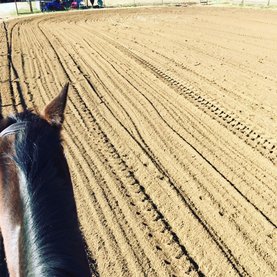|
In riding, you can never stop learning. It seems like the more time passes, the more I realize just how much I still don't know. Here are some things I've learned over my 20 years of riding and horse care.
Fitness is important.....so important! Your horse has to be fit enough to perform the job you are asking of him/her. Here are a few thoughts on this subject: 1) Keeping a schedule & having a program is important. Your horse is an athlete, treat him/her like one! Would you expect your grandma to go from months of only puttering around the house to being able to go out and run a 5K race or go on a 10 mile hike? No way! If you were preparing for a race would you go out and run 1/4 the length of the race a few times & then go for it? Probably not! Yet people do this with their horses all the time. You have to start with low intensity exercise and build. This program has to be tailored to your horse's body condition and your riding goals. Get a watch and start writing down your rides. Add intensity (faster paced work, hills, jumping) as well as the duration of workout over time. Horses, especially older ones, lose fitness quickly. If your horse gets time off, you need to start back at a lower intensity and slowly build from there. Although it has its place, body clipping is not a substitution for fitness. So many horse injuries are preventable with proper fitness. 2) If you have any kind of riding goals, you have to get your horse fit. This can be anything from taking lesson, trail riding, fox hunting, hunter/jumper shows, or dressage clinics. If you can't get your horse in shape and maintain his/her fitness, it's your responsibility to get help from someone else. If you haven't been able to ride due to weather/travel/other life commitments, you sometimes have to say no to an event you signed up for and instead stay home and get your horse in shape safely, slowly, and correctly. You will not make progress if your horse isn't fit. 3) Different horses need different programs for fitness. While OTTBs may seem like they get fit and stay fit easily, I've noticed that many may not be "mentally" fit. Most of my TBs need to be ridden, even if it's only for 15 minutes, at least three times/week. When they are ridden less, they seem a lot more likely to be hot, spooky, and overreactive. Similarly, the ability to canter madly for 10-15 min straight on the lunge line does not always equate to having the muscles needed to carry a rider through an intense jumping or dressage lesson. I learned this lesson with Stromboli when I first started taking him Prelim. He wasn't out of breath at the end of the XC phase, but he definitely lacked the muscles needed to be adjustable & collect himself properly. I finally saw the results of a truly fit horse at the end of last season when my XC felt smooth, light, and easy. Heavier breeds of horses may need more aerobic fitness activities such as trot/canter sets in the field. 4) A lot of horse behavior issues also relate to fitness. Horses in work are better behaved on the ground, keep their weight/muscle better, and are less prone to bad habits like eating wood fencing, tearing each other's blankets, and other destructive habits. Likewise, if I take my unfit horse out and expect him to do a lot of jumping, he's going to be uncomfortable which will probably manifest itself in the form of "bad behavior." Don't set yourself up for a bad ride...get them fit! Side note...rider Fitness: Riding is easier and more fun if you're fit too. If you're tired after a weekend of riding, a long trail ride, a fox hunt, show, or lesson, imagine how your horse feels!
0 Comments
Leave a Reply. |
Details
Christy ZweigAdventures eventing as a semi-pro in the mid-south. Archives
April 2024
Categories |
Proudly powered by Weebly


 RSS Feed
RSS Feed